The New Sundown Towns
- Oops!Something went wrong.Please try again later.
On July 24, 2018, Debra Blake was banished from every park in Grants Pass, Oregon. She added the exclusion order to a growing pile of violations—for sleeping, sitting, camping, and trespassing, a mix of civil and criminal charges that accrued late fees, bench warrants, and jail stints, wrecked her credit and job prospects, and made her a known entity to police. At 59, Blake had lived in Grants Pass for almost 15 years, seven without a home. She didn’t qualify for a bed in the town’s only shelter, and there was no place she could legally rest outdoors. “It seemed like everywhere she camped she would get tickets,” a friend of hers told me. “Every night. Everywhere. Anytime the cops caught her, she was in the wrong place.”
In fall 2018, Blake sued the city for violating her constitutional rights. Friends described her to me as “motherly,” “selfless,” and “a force to be reckoned with.” By then, Blake owed the city $4,000 in fines. “I am afraid at all times in Grants Pass that I could be arrested, ticketed, and prosecuted for sleeping outside or for covering myself with a blanket to stay warm,” she testified in the lawsuit. She wasn’t alone. “I have met dozens, if not hundreds, of homeless people in Grants Pass,” she said. “They have all had similar experiences.” In September 2019, her debt cresting $5,000, Blake was banished from the parks a second time. She sought refuge beyond city limits, in places she feared were “not physically safe … far from food and other services.”
Banishment of unhoused people was the point, her class-action suit argued. Ahead of the tourist season in spring 2013, officials had held a roundtable on the city’s “vagrancy problems.” Meeting minutes rehearse now-standard talking points in our national homelessness crisis. A councilman explained the utility of punishment: “Until the pain of staying the same outweighs the pain of changing, people will not change.” The deputy police chief suggested a “sobering center” that would house people in “a jail cell with steel doors.” Other officials urged banning food distribution (“If you stop feeding them, then they will stop coming”) and posting “zero tolerance” signs at all entrances to the city. Grants Pass redesigned its municipal code to incorporate these ideas. “The point,” one councilman said, was “to make it uncomfortable enough for them in our city so they will want to move on down the road.”
Blake won her case. As Ed Johnson, Blake’s lawyer at the Oregon Law Center, told me, Grants Pass had managed to design a “set of ordinances that made it illegal to survive on every inch of public land 24 hours a day.” In 2020, the Oregon District Court ruled that the imposed fees were excessive, that exclusion orders violated due process, and that blanket criminalization constituted cruel and unusual punishment against those “engaging in the unavoidable, biological, life-sustaining acts of sleeping and resting.” Blake passed away before she could see the results: an injunction that allows homeless people to rest in Grants Pass parks for 24 hours at a time, as long as there is nowhere else for them to go. Her friend said it felt as if unhoused people “didn’t have to hide anymore.”
But the city appealed—all the way to the U.S. Supreme Court. Gripped by a right-wing supermajority, that court has already restricted abortion, undermined the Environmental Protection Agency, curtailed affirmative action, and voided pandemic eviction moratoriums. Last fall, a flood of official briefs urged the court to take up the case. Their authors included business improvement and sheriffs’ associations, archconservative think tanks like the Goldwater Institute, the liberal cities of San Francisco and Los Angeles, and California Governor Gavin Newsom, a Democrat.
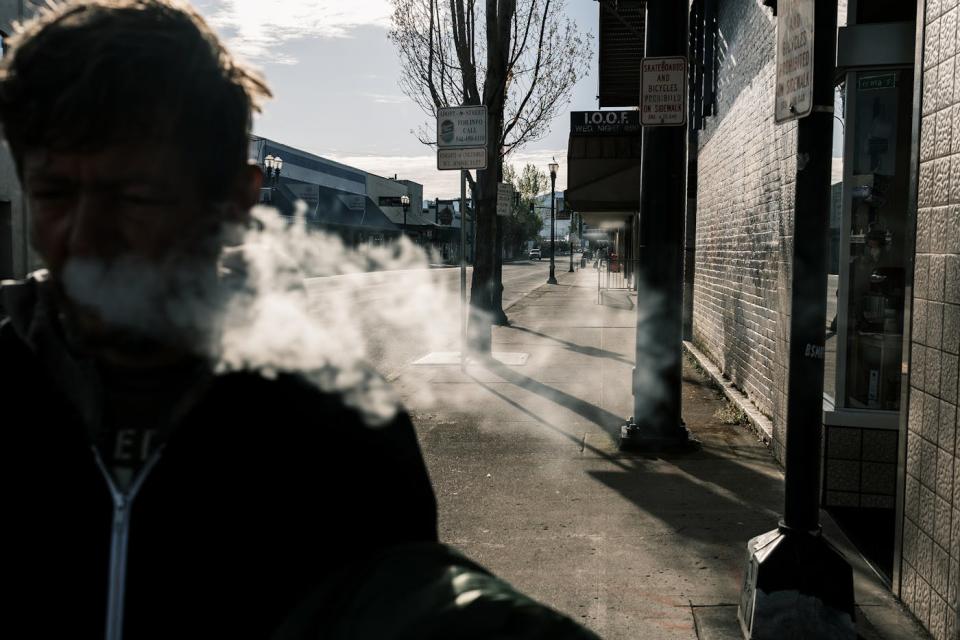
Homelessness policies that fail drive electoral success, and politicians can claim an empty sidewalk—and an unsolved crisis—as a political victory.
Now a town of fewer than 40,000 people may get to rewrite the scripts of homelessness policy for the entire United States. When the court rules, likely in late June, unhoused people could lose the Eighth Amendment as a bulwark against widespread criminalization and encampment sweeps. But Grants Pass’s current practices, even under the injunction, suggest cruelty is rarely unusual. The embattled Oregon town is a microcosm of the drama now playing out among politicians, their constituents, and the fast-growing number of people who live in public space. In this bipartisan production, homelessness is portrayed as something police can deter and rehabilitation can cure. Homelessness policies that fail drive electoral success, and politicians can claim an empty sidewalk—and an unsolved crisis—as a political victory.
Grants Pass’s mayor, Sara Bristol, often wears an expression of amused exasperation. The day we met, she’d tried to dispel a Facebook rumor that nonprofit warming shelters would house undocumented immigrants. She often finds herself disputing the claim that homeless people in town are outsiders. Born in Grants Pass, not registered with either party, Bristol was elected just as the injunction settled into place, turning new clusters of tents—on green spaces abutting the Rogue River, on muddy dirt by the ball fields, on the grass strip of a road median—into Bristolvilles. In fall 2023, a group of residents campaigned for her recall, gathering signatures under signs that read TAKE BACK OUR PARKS. Bristol maintained her mandate.
Like all members of City Council, Bristol is an unpaid volunteer. Early this March, I rode shotgun in her SUV, which beeped for an oil change. She took detours to point out tents and camper vans, two back-to-back hills she sped down for thrills as a teen, and a mural on D Street, a scene of downtown painted by her father, who also served as the city’s mayor: Her father’s likeness steps out of a movie theater; her uncle walks his dog.
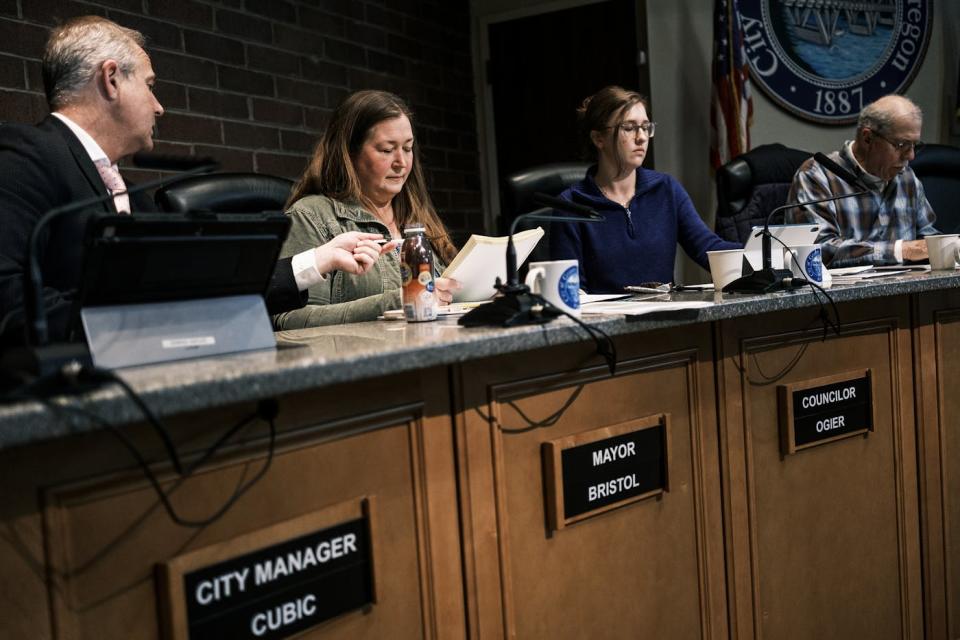
Residents of Grants Pass call its single six-story structure “Tall Building.” Since the timber industry collapsed in the 1980s, real estate and tourism have helped revive the economy. Travelers seek the Rogue River, which cuts the city in half. Californians cash in their property values and fund their retirement in the city. Restored brick facades along the 18 square blocks of historic downtown lure passersby to tapas restaurants and antique shops. Over the last 20 years, Grants Pass nearly doubled in size. Almost a third of renters spend more than half their income on rent. The most recent “Point in Time” count logged more than 500 homeless people, a number that the count’s coordinator said was certainly an underestimation, conducted at the height of winter, when people seek shelter anywhere they can find it. Many don’t want to be found.
The city is an odd estuary of lawn-sign liberals and flag-flying conservatives. During the 2020 uprisings against police violence, an open-carry guard convened at the 140-foot American flag on Union Avenue, patrolling the roof of the local Baskin-Robbins. The county boasts the lowest property taxes in the state and hosts two secessionist movements: the State of Jefferson, which aims to save red, rural southern Oregon and Northern California from the grip of blue urban centers, and the Greater Idaho movement, which seeks a more perfect union between the county and its Trump-voting eastern neighbor. Residents often pointed me to the legacy of the Ku Klux Klan. One unhoused person I met told me his grandfather had been a wizard.
The first time Bristol used her power to break a City Council tie, she voted to install portable toilets in the city’s parks. Some residents and officials warned the move would “encourage” homelessness, but, Bristol said, “nobody’s going to come live in Grants Pass, Oregon, because they heard there’s a Porta Potty in Riverside Park.” Nonetheless, that “if you build it, they will come” fear has suffused public comment periods, inspired town ordinances, and compromised resources from the state. When the Oregon legislature earmarked $200 million for homelessness, county supervisors refused to issue a required “state of emergency” declaration or send in an application for the funds.
“Public health, mental health, housing services are not things that the city of Grants Pass provide, but we do have parks,” Bristol said. “The city doesn’t want our parks to become homeless camps.” Swerving between compassion and revanchism, Bristol inhabits the fraught predicament of many local elected officials: Facing a decades-long national crisis any single municipality lacks the tools to solve, they have little choice but to try to manage it. (Grants Pass’s total operating budget for 2023 was just shy of $49 million.)
“You have frustrated neighbors?” Bristol texted me about my sources for this story. Research uncovered many. Recall organizers continue to protest at the parks. Vigilantes honk their horns, throw trash, and yell “carp,” meaning “bottom-feeders,” from their cars. Residents circulate photos of unhoused people on social media; one Facebook group promotes citizens taking matters into their own hands, even “final answers.” Bristol suggested I contact David Dapper. She did not mention that, in 2021, Dapper had been arrested at Tussing Park for pointing a gun at unhoused people, including one pregnant woman, and firing into the air.
Laws targeting the homeless have surged alongside homelessness itself: The number of bans on camping, resting, standing around, and asking for money all just about doubled between 2006 and 2019. But some laws have been overturned by the courts. Lawyers leveraged the First Amendment to protect panhandling and handing out food; the Fourth and Fourteenth Amendments to prevent belongings from getting destroyed in sweeps. The United States Constitution, Shayla Myers of the Legal Aid Foundation of Los Angeles said, “provides that last line of defense” for unhoused people’s civil liberties.
In September 2018, the U.S. Court of Appeals for the Ninth Circuit issued a landmark ruling governing the Western United States, where more than half of all unsheltered homeless people in the country reside. The court determined in Martin v. Boise that criminalizing the “involuntary … unavoidable consequence of being homeless,” sleeping in public, when there was no “adequate” alternative place to go, violated the Eighth Amendment’s prohibition against cruel and unusual punishment. The district court and appellate court rulings against the city of Grants Pass built on this foundation. (After Debra Blake’s death, the case was named City of Grants Pass v. Johnson for another unhoused plaintiff, Gloria Johnson.) The city’s ordinances had attempted to distinguish the necessity “sleeping” from voluntary “camping,” the latter signaled by the presence of anything that would separate a person from the elements, including a tent, a bedroll, cardboard, or a blanket. But staying warm and dry, the courts said, was as necessary as rest. The town’s use of civil rather than criminal penalties could not evade the amendment either.
Led by counselor Theane Evangelis, Los Angeles law firm Gibson Dunn represented Grants Pass in its Supreme Court appeal. The firm has also defended Chevron against a class-action pollution suit and the corporation behind the Dakota Access Pipeline. In 2000, it argued the Supreme Court case that would deny a Florida recount, securing the White House for George W. Bush. In 2010, it convinced the court to approve unlimited private campaign spending in Citizens United.
Theane Evangelis wrote in an email to me that Eighth Amendment rulings “are harming the very people they purport to protect.” A white paper Evangelis co-wrote expands on this view: Camping bans are “decades-old, ordinary, municipal laws” that prevent the spread of encampments, incubators of deadly diseases and drug use that victimize unhoused people and threaten surrounding residents and businesses. The paper also highlights the “axiomatic” function of anti-homeless laws as deterrence: Like laws against every other criminal activity, the threat of punishment dissuades people from living on the streets. Eighth Amendment rulings, by contrast, are an invitation tantamount to “a constitutional right to camp in public.”
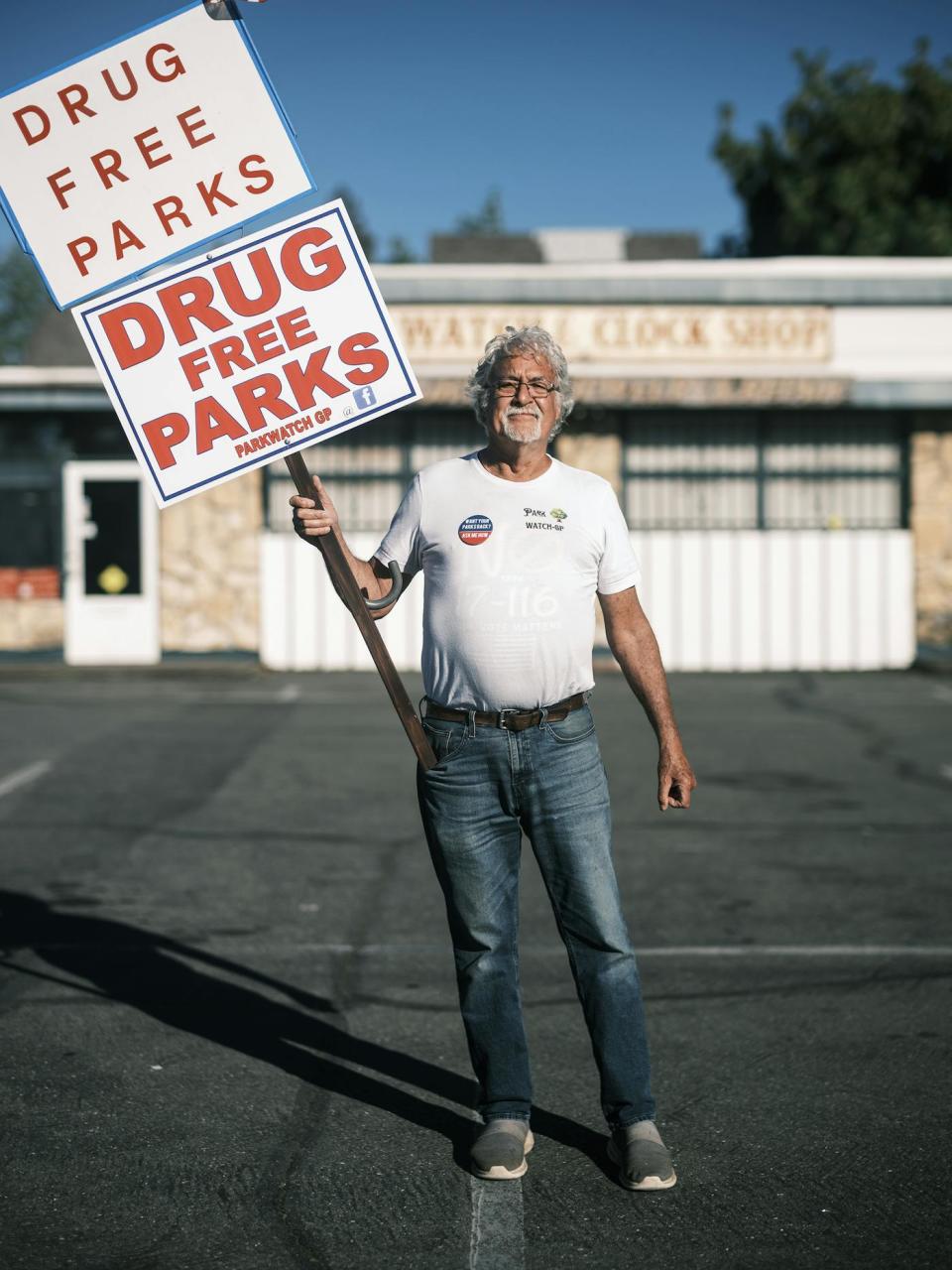
But even under the rulings, the authors observed, cities are free to issue time, manner, and place restrictions on people sleeping or camping in public space. And the rulings have “no effect on laws prohibiting drug dealing, violent criminal activity, and conduct that poses environmental and health hazards.”
For Republicans, battles over homelessness have strategic as well as regulatory utility. They reinforce the party’s ethos of personal responsibility, win new recruits, and agitate its base. Pundits and politicians launder their racism by fomenting disgust at a seemingly race-neutral category, “the homeless,” in which Black people are vastly overrepresented. Fox News and X grifters exploit videos of encampments as evidence of the failures of liberal governance. At a February press conference, Florida Governor Ron DeSantis announced a new camping ban. On his podium, a sign read “Don’t Allow Florida to Become San Francisco.”
But there is often little daylight between Democrats and Republicans in their efforts to engineer cities as sundown towns. It wasn’t Idaho where unhoused people first called on the Eighth Amendment to protect themselves from criminalization; that distinction was California’s. In a 2007 settlement, the court struck down 41.18, Los Angeles’s “sit-lie” law, a ban on sitting, sleeping, lying, and storing property in public. San Francisco now boasts 24 unique anti-homeless laws. Recent reports show unhoused people account for a disproportionate number of arrests, even in liberal strongholds: one in six in L.A., and one in two in Portland.
Liberal politicians appease their housed constituents by empowering them to personally order encampment sweeps. Alongside Amazon packages, DoorDash dinners, and movies on HBO, residents can now expect policing on demand.
Liberal politicians appease their housed constituents by empowering them to personally order encampment sweeps. Alongside Amazon packages, DoorDash dinners, and movies on HBO, residents can now expect policing on demand. In this model, UCLA assistant professor of sociology Chris Herring said, constituent emails and 311 calls drive police enforcement. In 2017, complaints from San Francisco residents directed police to address “homeless concerns” nearly 100,000 times. In 2020, San Francisco Mayor London Breed texted the police chief to clear specific people in her line of sight. “Man sleeping on bench on Hayes st near gough,” one text declared. “Can someone come ASAP. I’m in the area having lunch.”
Liberal cities met Martin not as an opportunity to diversify their efforts to house people, but to creatively remove them within the confines of the law. In 2021, Los Angeles updated its sit-lie law with exclusion zones—around parks, schools, libraries, underpasses, and shelters—which effectively if not technically blanket the city. Other cities responded to Martin’s demand that unhoused people need “alternative” places to sleep before they can be ticketed or arrested by codifying it into a cold calculus of beds versus tents. Both San Diego and Las Vegas now issue misdemeanors for camping if shelter space exists. “The right to shelter must be paired with the obligation to use it,” Sacramento Mayor Darrell Steinberg has said. In other words, unhoused people must accept shelter at the penalty of fines or imprisonment.
Democrats have their own rhetoric of deterrence, a “tough love” imbrication of coercion and care. Criminalization, San Francisco explains in its brief in the Grants Pass case, is essential “to encourage individuals … to accept services.” This model fastens the stick of policing to the carrot of shelter and rehabilitation. Punishment helps unhoused people make a choice that ultimately serves them. One sociologist termed this approach “therapeutic policing.”
But research shows that criminalization perpetuates rather than discourages homelessness, disqualifying unhoused people from the support they need, including federal housing benefits. A criminal record and credit scores wrecked by civil debt mean fewer employers or landlords willing to give them a chance. In the short term, arrests and sweeps interrupt the efforts of service providers. Unhoused people lose medication, critical documents, survival gear, and fragile support networks, losses that compound the physical and emotional toll of living outdoors.
When voters demand action on homelessness, sweeps are a useful but temporary fix; politicians keen to show progress on the issue resort to shuffling the problem around. In two years, according to L.A.’s own data, 81 percent of encampments reemerged after “sit-lie” enforcement. In Seattle, exclusion orders ultimately failed to prevent people from living in parks. In one San Francisco study, most of the 350 homeless people interviewed said sweeps pushed them just a few blocks away.
When sweeps fail, politicians blame the courts. In August 2023, Mayor Breed joined a protest on the steps of the Ninth Circuit Court, decrying a recent injunction, which found that the city would sweep, cite, and arrest unhoused people when no alternative shelter existed to offer them; the wait list for its shelters was 1,000 people long. Standing in front of a sign that read DON’T RYUN SF (after Judge Donna Ryu, who issued the order), Breed accused the courts of “micromanag[ing]” her efforts to clear encampments. She was “sick and tired of being sick and tired,” she said, quoting civil rights leader Fannie Lou Hamer.
With a flurry of final, mostly neutral briefs sent to the court this spring, liberal cities supported the Grants Pass case as a vehicle to limit or clarify lower court rulings. San Francisco’s brief demanded the freedom “to enforce the will” of its voters. Los Angeles asked whether a count of all homeless individuals is required every day before it can enforce its laws. (The city has three times more unhoused people than shelter beds.) Shayla Myers called these bids disingenuous, even dangerous: No court has blocked anything besides blanket restrictions, cities have ample room to say where unhoused people can be, and the Supreme Court is in a frenzy of “overturning rights.”
California’s Governor Newsom sent his own plea that the court take the case, admitting it was a “hell of a statement for a progressive Democrat.” His final, neutral brief insists that he does not support the criminalization of homelessness. But his warning that lower courts have erected a “roadblock” that “hamstring[s]” cities echoes Grants Pass’s own suit, which uses the same words; Grants Pass’s attorney, who says they’ve “tied the hands” of officials; and the dissenting Ninth Circuit judge, who wrote that while Martin “handcuffed local jurisdictions,” Grants Pass “places them in a straitjacket.”
“I’m in the cyclical hell that everyone else is in,” John Babb told me. That morning, his and every other tent in Baker Park had been orange-tagged. Around 7 a.m., Grants Pass police made their twice-weekly rounds, issuing notices to pack up and move. The “Public Notice of Illegal Camping,” printed on 8 x 10 orange copy paper, instructs recipients, “Your campsite is subject to involuntary removal” 72 hours after issuance.
A “compulsive rule follower,” Babb had situated his tent strategically: a dozen feet away from the banks of the Rogue River, far enough from Department of Transportation property under the bridge and the two “buffer zones” surrounding the paths on either side of him. I sat on a thick navy blue poster board rolled out in front of his tent. Babb, in a waffle-knit long sleeve and narrow black jeans, kept the door flap around him like a shawl. The night’s temperatures had dropped into the 20s, and the morning sun was only just breaking up the chill.
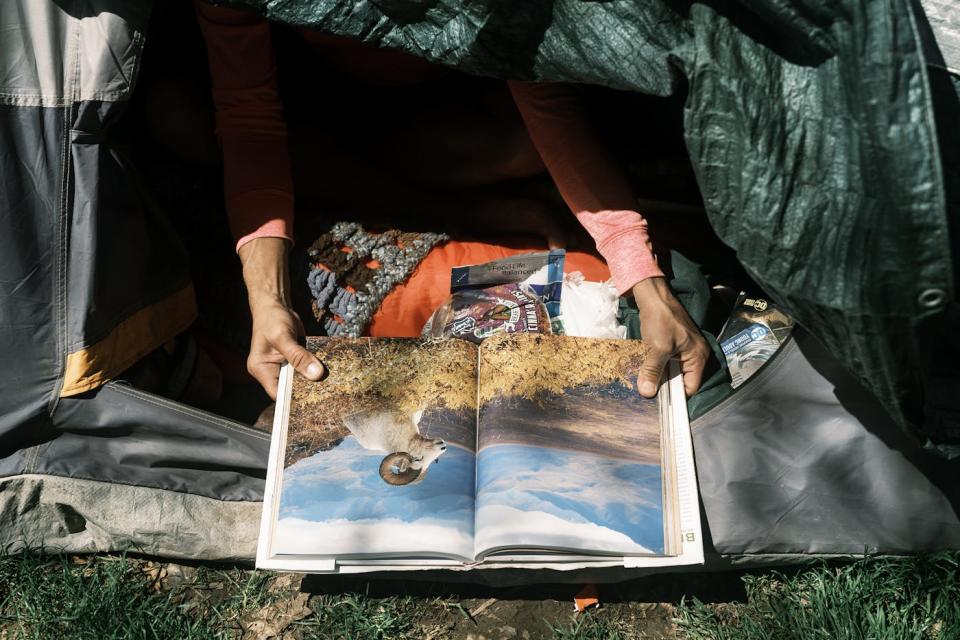
Despite her detractors’ accusations of leniency, Mayor Bristol has overseen a crackdown on encampments. Forcing houseless people to relocate, Bristol said, “helps make it so that people don’t have a sense of permanency, like they own that square of the park. Even under the injunction, the city can issue tickets for illegal camping with 24 hours’ notice. In a nearly five-hour council meeting in June 2023, the city introduced further rules. It prohibited “scattering rubbish,” using propane heaters, and public needle exchanges (which can halve the spread of HIV and hepatitis C); it established “buffer zones” around walkways and pavilions; and it limited park users to taking up a total spatial footprint of eight feet by eight feet. Police had made rounds sizing up tents to inform the decision: “Six by eight looked OK to me,” the chief explained. “Ten by 10 did not look OK to me.” Most violations earn a ticket for $295—$537 if left unpaid. During public comment, one resident argued: “Rights aren’t given; they’re earned with responsibilities. Everybody has to earn their rights.”
Two police officers, Tim Artoff and Jason McGinnis, make up Grants Pass’s Community Response Team, dedicated to enforcing the city’s ordinances at its parks. (Neither the officers nor the police chief responded to interview requests.) Babb went to high school with Artoff, whom Babb remembers with a mullet and acne. Every unhoused person I talked to knew both officers by name. The entire Grants Pass police force has fewer than 60 officers; about six are on patrol at a time. In short, a full third of the city’s resources for public safety—itself almost a third of the city’s budget—are directed to policing its unhoused residents.
Babb had just passed his two-year anniversary of living outside. When he lost both his parents, whom he called his “best friends,” he couldn’t remain in the house they shared. Then the city impounded his car, and he went from “cushy homeless” to living outdoors. Without the care of his mother, he had to face the challenge of “learning to adult” at 52. Babb was ambivalent about standing out in the community as “an English major,” an “Eskimo,” and gay. People “go out of their way to paint everyone with the same brush, like, ‘Well, they just don’t want to work. They’re useless drug addicts,’” he said. For the resources to stand up for himself, he sometimes turned to Debra Blake’s memory.
“With every fiber of my being, I know that I’m not going to be in this circumstance forever,” he said. But life outdoors puts up roadblocks to getting out: “It’s a vicious cycle.… It kind of compounds and compounds.” He has lost four IDs. Moving wears down his gear and triggers his arthritis. His phone charger had been soaked through in a recent storm—not that he could find somewhere to plug it in. The city’s ordinances, even under the injunction, erect their own obstacles. “Two tickets. That’s all I make in a year.”
That morning, Babb had walked the half-mile to Riverside Park, where a host of volunteers and nonprofits deliver the city’s only services, providing wound care and distributing groceries, gloves, and naloxone. The city itself has restricted access to electricity, trash cans, bathrooms, and running water at its parks. Asked about the specifics of “scattering rubbish” violations, Artoff once said, “I don’t know it by heart.… It includes garbage and other items of personal property”—a slippage between trash and houseless people’s belongings. Of the relentless cycle of sweeps, one person told me, “The cops run them around like they’re goddamn farm animals.” People have to pick up everything they own and move it between the only places they are allowed to be—one pen to another.
Criminalizing homelessness is an increasingly organized effort on the right. In 2021, Joe Lonsdale, a co-founder of the Palantir data analysis company, bankrolled a camping ban in Austin. He helped establish the Cicero Institute to take that campaign national. Already passed, introduced, or adapted in 12 states, Cicero’s template legislation bans camping statewide—at the penalty of a $5,000 fine and a month in prison—and redirects all but 10 percent of homelessness funding from permanent to temporary housing, with mandatory drug treatment. One policy director summarized the strategy as “treatment first, not Housing First.”
Ironically, the right is seeking to undo a framework popularized under George W. Bush. Before Bush, federal policies prioritized short-term shelter, offering permanent housing as a reward for sobriety and employment. Housing First promised the opposite: unconditional, permanent housing with voluntary mental health and substance care. Appeasing fiscal and humanitarian concerns and once enjoying bipartisan support, Housing First has been shown to use public resources efficiently—housing people costs less than repeatedly incarcerating and hospitalizing them—and to keep people housed over the long term. The framework has been adopted widely. It’s the official policy of the state of California and the Department of Veterans Affairs. It gets preference for federal grants. But no level of government has built anywhere near enough permanent housing to keep pace with the growing number of houseless people.
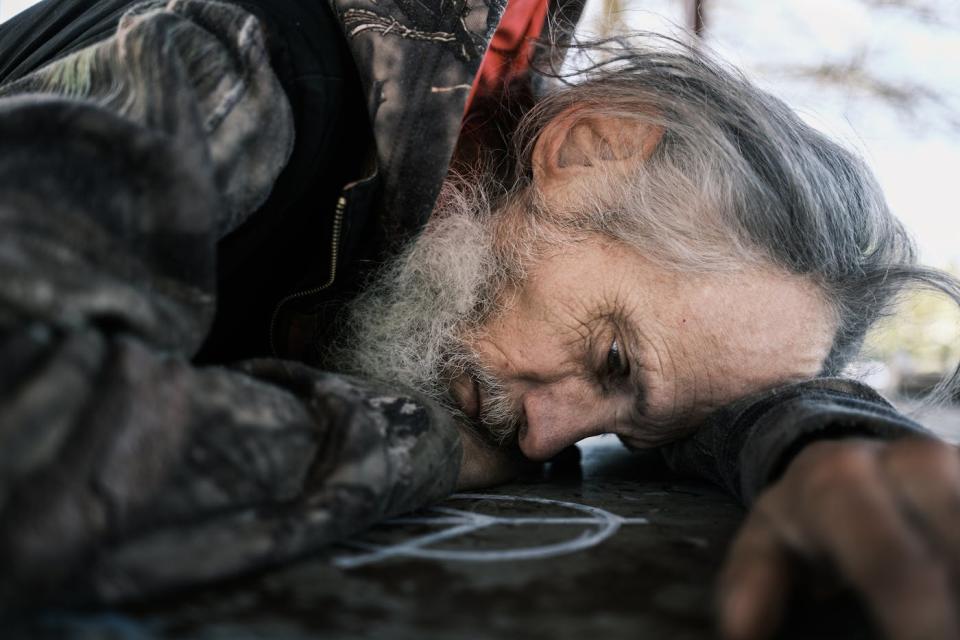
Donald Trump hastened a backlash. In 2019, his Council of Economic Advisers disparaged federal focus on permanent housing and local leniency toward “use of tents.” That year, Trump put Robert Marbut in charge of the United States Interagency Council on Homelessness; Marbut had founded a San Antonio super-shelter fit for 1,500, where residents who fail to pass a drug test or perform chores must sleep in a fenced area outdoors. Marbut has said he favored “Housing Fourth.”
Cutting swiftly between shots of unhoused people in distress, a video by the Cicero Institute and PragerU warns that cities with rising homeless populations “have one policy in common: Housing First.” It makes the case that homelessness “is not a poverty problem…. The root of the problem is mental illness and addiction.” Rejecting, in Lonsdale’s words, “the Marxist idea that American capitalism causes homelessness,” conservatives insist that criminalization and mandatory treatment will promote personal accountability and get people off the streets. In San Fransicko: Why Progressives Ruin Cities, Michael Shellenberger proposed fusing police, mental health, and addiction treatment into a superagency called “Cal-Psych.”
If elected president, Trump has promised to ban camping nationwide—a promise the Grants Pass ruling may help him keep. “The homeless have no right to turn every park and sidewalk into a place for them to squat and do drugs,” he warned in a 2023 campaign ad. Trump said he would erect sanctioned tent cities, with “doctors, psychiatrists, social workers, and drug rehab specialists,” where unhoused people “can be relocated and their problems identified.”
Nationally, unhoused people with such problems are in the minority: 21 percent struggle with a serious mental illness; 16 percent with substance abuse. Studies reflect that forced treatment doesn’t stop drug use. Nor does drug treatment treat homelessness. Of almost 200,000 homeless people who entered substance treatment, one study demonstrated, nearly 70 percent remained homeless afterward. Treatment programs will also prove difficult to expand; they already face critical staff shortages.
Democrats may be turning toward treatment, too—a process augured by Gavin Newsom’s career. As San Francisco supervisor, Newsom implemented the “Care Not Cash” program, which redirected money from residents’ welfare checks into shelter beds. (“I take your cash, and I buy drugs,” a montage of men confessed in an ad for the measure.) As governor, Newsom loosened standards for conservatorship and initiated “CARE Courts,” which empower judges to commit people into treatment involuntarily. This year, Newsom’s “Treatment Not Tents” eked out a victory at the ballot: $6 billion to fund inpatient treatment facilities. “California’s homelessness crisis really goes back to the closure of state mental hospitals,” he told voters. (Shellenberger has accused Newsom of “co-opting” his imagined Cal-Psych.)
Homelessness is “a social issue, a political issue, a political economic issue, and not one of personal characteristics or personal problems,” said Don Mitchell, a professor of cultural geography at Sweden’s Uppsala University. A focus on mental health and addiction issues both stigmatizes homelessness and neutralizes its indictment of the status quo: It takes nearly four full-time, minimum wage jobs to afford the typical two-bedroom rent. While municipalities increasingly rely on real estate speculation for revenue, homeowners on inflating property values for retirements, and tenants on doubling up or starving to pay the rent, homelessness grows. Homelessness itself serves as deterrence, “a warning for the rest of us,” Mitchell said, punishment for the crime of failing to work hard enough to pay for a home.
In an email to me, a spokesperson for the governor wrote that beyond prioritizing those “sadly left untreated,” Newsom has invested in new housing programs and vastly increased homelessness funding. This is true: One thing liberals don’t concede is their commitment of public resources to the problem. But, as a report of three years of California’s progress on homelessness shows, about half of the $5.5 billion that the state spent on housing went to subsidies for private developments. Most of that housing is for people making 80 percent of area median income or less; in L.A., that’s $77,700 a year. Sanctioned encampments are a stark example of local spending priorities. San Francisco’s cost $5,100 per tent, per month—almost double the typical rent.
Megan rolled a folding mattress down the footpath toward the edge of Riverside Park, high-vis yellow jacket and eyebrow ring reflecting the midday sun. Her frequent pauses as she talked suggested both composure and exhaustion. The day before, Officer Artoff had handed her a ticket and an exclusion order from Baker Park, violation of which was punishable by a $1,250 fine and up to a month in jail. She had to gather everything she had in the freezing rain and rebuild.
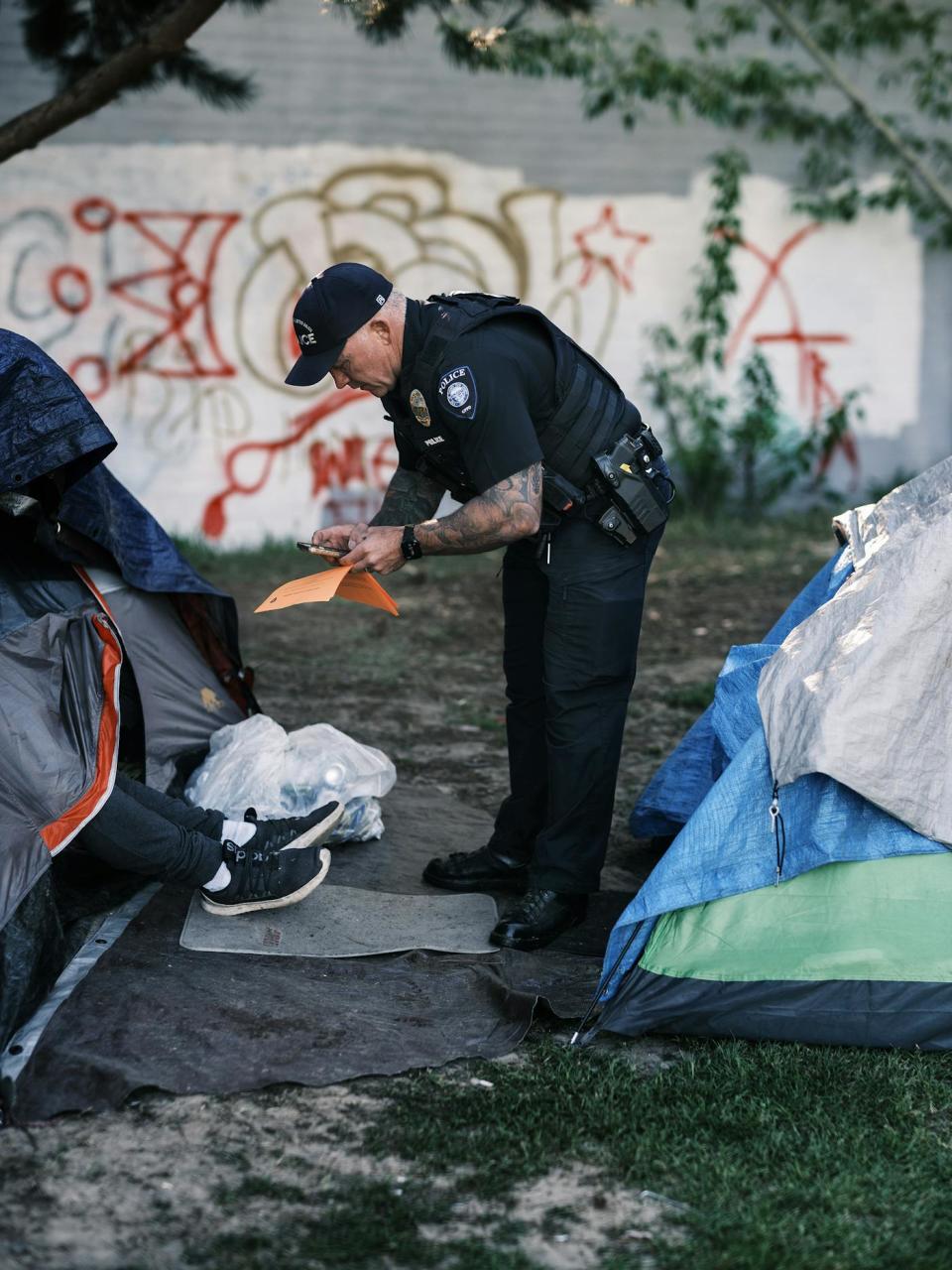
When the million-acre Alameda fire destroyed more than 2,500 homes, Megan’s camper was displaced. Then it was stolen. She moved to Grants Pass in her car, which the city soon impounded for expired tags. “They took my safety, putting me out here,” she said. Suddenly, she was a single woman with no door to lock at night. To dry rain-soaked clothes, find hot food, and connect to resources, she had to walk or wait for the bus. She was forced to rely on other people’s schedules, “everybody else instead of myself.” The exhaustion and stress exacerbated her addiction. “I’m sorry, but you think that now I really am not wanting to get high for the energy to do it all?” she said. “It’s impossible out here.”
David Peery, who served as class representative of unhoused people in a suit against the city of Miami, locates unhoused people’s struggles with addiction in the experience of living outdoors: They turn to substances when it’s too cold or uncomfortable to sleep, for help staying awake when there’s no place to rest, or to address pain when they can’t access medical care. Without stable housing, they look for the predictability of a hit. Recently, concerns about unhoused people’s drug use fueled a backlash against a 2020 Oregon state measure that had decriminalized possession of small amounts of illicit drugs. Accused of enabling addiction and encouraging public disorder, the measure now sits on the governor’s desk for repeal.
The concerns echo in Grants Pass. The Sobering Center that the city planned in its vagrancy roundtable opened its doors in 2016. The facility consists of 12 locked rooms, where people can stay for up to 24 hours. Almost half of its nightly inhabitants are placed there by the police. The town’s only shelter, the Gospel Rescue Mission, has a zero-tolerance approach: sobriety from drugs, alcohol, even nicotine; residents have to quit smoking to qualify for one of the 138 beds. The “pray-to-stay” facility’s 29 rules also include attending church services that follow the dictates of the “Apostles’ Creed,” not interacting with members of the opposite sex, and presenting oneself in line with one’s “birth gender.” (I am personally out on three counts.) Residents must work 40 hours a week at the mission and can’t look for a job elsewhere. Executive director Brian Bouteller defends his shelter’s strict rules and advocates stricter enforcement at parks. In a recent video, he describes people living in the parks as “can and won’t”: They can leave homelessness but won’t, because they are receiving “free needles,” meals, and medical care.
According to the courts, only “low-barrier” shelters, which don’t require employment or sobriety, count as “adequate” alternatives to sleeping outdoors. (“I read the lawsuit,” Bristol said.) Grants Pass’s one low-barrier facility, Foundry Village, opened in 2021. It was paid for and constructed by volunteers. Doug Walker, a bald and bespectacled retired developer who chairs the city’s Housing Advisory Committee, helped locate the land, raise the funds, and build the site. I interviewed Walker at his home, where I was greeted with the classic yard sign, WE BELIEVE BLACK LIVES MATTER, NO HUMAN IS ILLEGAL, LOVE IS LOVE… “I wouldn’t say I am super passionate about homeless people,” Walker told me. “I agree with the idea of taking back our parks. But we still have to find a place for these people to be. They’re still human beings.”
Walker’s four-person group found a parcel of land a few blocks from the Gospel Rescue Mission and paid the $70,000 to buy it themselves. “The city didn’t have to do a damn thing other than be difficult,” Walker said. The group constructed 17 bedrooms of duplex sheds, with shared bathrooms and kitchens, using a tiny-home village in nearby Medford as a model. Walker stressed the importance of management at the facility. Residents “have to learn to cooperate and function in society … and that does not work if you just give somebody a place.” The problem, he said, is what’s waiting for residents on the other side. They “address their issues and they’re ready to move to an apartment or move somewhere. But there is no somewhere. There are no apartments.... There’s no place for them to go.”
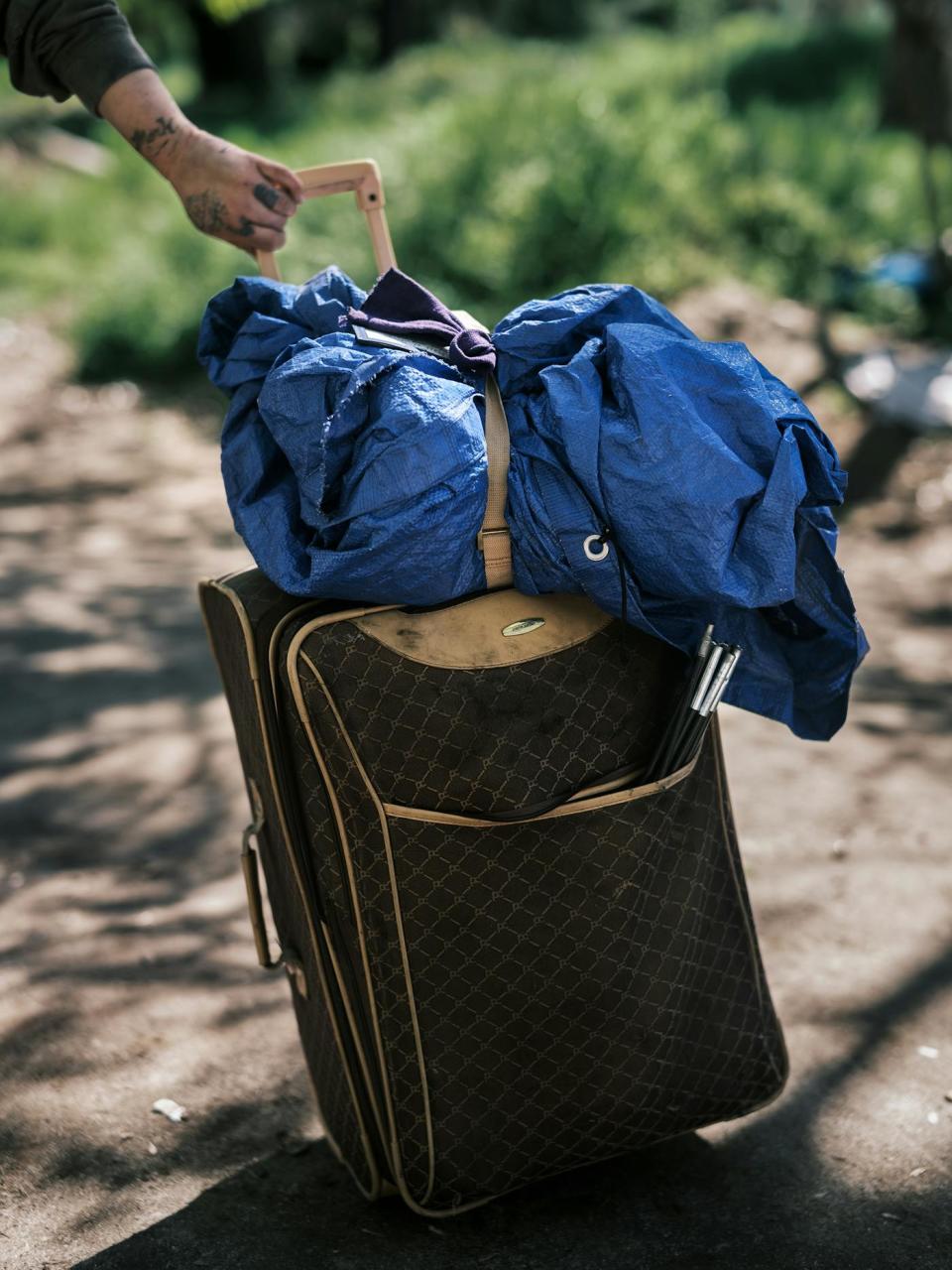
The injunction made Grants Pass’s ability to move people dependent on places to put them. Like Walker, Mayor Bristol described low-barrier shelter capacity in expedient rather than humanitarian terms: It creates “a place where people can go that is not the parks, so that we can have clean, safe parks again.” In 2022, when the city received almost a million dollars from the state’s Department of Administrative Services, Bristol campaigned to open a sanctioned encampment in Grants Pass. She was impressed by Medford’s “clean and orderly” facility. Medford police even supported the place. She related the idea to a quote from Martin Luther King Jr.: “You don’t have to see the whole staircase, just take the first step.” But other officials bristled. Dwayne Yunker, a Republican real estate broker who serves on both City Council and the state legislature, joined the mission’s Bouteller in a conversation entitled “Low Barrier = Low Safety.” (Yunker has also suggested that the city privatize all its parks, so police will be free to remove people.) Fearful for their safety and their home values, locals resisted each site proposed. “There’s always a school or a day care or a playground,” Walker said. “It’s always near people.” They almost had a deal with one prospective landowner, who pulled out when the community intervened.
When a local treatment agency, OnTrack, submitted a proposal, it won the funds—“the only pot of money that we had to start a campground or a shelter,” Bristol said. OnTrack’s pretreatment facility will host 12 individuals while they wait for longer-term residential treatment placements. “This is not a come-and-go facility,” its engineer clarified: no drugs, no visitors, and a curfew from 6 p.m. to 6 a.m.
A few weeks back, Megan asked Officer Artoff to help her to get into rehab. He said he’d let her stay at Baker Park as long as she checked in with her caseworker and stuck to their plan. She agreed. Her caseworker even complimented Megan as a “great advocate” for herself. She was thrilled when they found her a spot. But it was in Jackson County. “Two things that I asked for was a rehab that allowed me to smoke,” she explained. “And then to not have anything to do with Jackson County.” The personal crises of her past all stemmed from that place, she said: “I just didn’t want to have to be there and have to face it…. I felt like I was totally set up for failure.” She refused the bed. Artoff banished her from the park. “They want to help us get out of here, but they just made it two days behind for me,” she said, pointing to her scattered belongings.
The Eighth Amendment defense of unhoused people is shaped by two Supreme Court cases about addiction. On the one side is 1962’s Robinson v. California, which recognized addiction as an involuntary “status or condition, not an act,” and determined that being an addict could not in and of itself be a crime. That idea, the court said, was as cruel and unusual as jailing someone for having a cold. On the other is 1968’s Powell v. Texas, which authorized laws against addiction-related conduct, including public intoxication and drug possession. More than 50 years of jurisprudence rest on what’s known as this status-versus-conduct divide. “You don’t arrest people simply because of who they are, rather than what they do,” David Peery warned. “You continue that path of dehumanization … you end up with a fascist society.”
Courts have ruled that total bans on sleeping in public when no alternatives exist are unconstitutional because they effectively make the involuntary status of homelessness a crime. But that defense—and the Eighth Amendment’s protection of any status at all—is in jeopardy now. On April 22, Evangelis argued before the Supreme Court that Eighth Amendment prohibitions against “cruel and unusual punishment” merely prevent specific penalties: Cities regularly issue tickets and put people in prison; the amendment could be used, she implied, only if they put homeless people in the stocks. Conservative justices suggested that status was too slippery a slope. Justice John Roberts asked twice if “being a bank robber” counted as a status; Justice Samuel Alito wondered about kleptomaniacs and pedophiles.
Evangelis also argued that sleeping in public is voluntary conduct that cities should have the right to criminalize. She highlighted empty beds at the rescue mission and described an unhoused plaintiff who did not want to subject herself to its rules. A camping ban, Evangelis said, would serve as an “incentive” for people to accept whatever was available. Alito said he suspected people often found themselves homeless because of voluntary “life choices,” such as refusing antipsychotics or rehab. The United States Justice Department’s intervention at the proceedings in part supported this view: It argued that cities should be allowed to fine or arrest unhoused people based on an “individualized determination” of their personal circumstances.
Ignoring the systemic math of tattered social safety nets, stagnant wages, and rising rents, politicians often frame homelessness as an individual choice, even a “lifestyle.” Homeless people are deemed “service resistant” when they choose a tent over a space indoors, even when that space is temporary or separates them from their community or belongings. UCLA’s Chris Herring pointed to the seemingly logical decision people regularly make in San Francisco: They decline one night in a congregate shelter because they’d have to give up the survival gear they’d surely need for the next one. “The governing narrative,” Peery said, reflects a profound distrust of the personal agency of the poor: Homeless people “made bad choices,” the story goes, “so we need to get the police to force them into making better choices.”
Behavioral modification is as old as the poorhouse, where residents were forced to break rocks to earn a shelter bed. I often fear the future of homelessness policy may look like a regression into that past. Palantir co-founder Joe Lonsdale speaks wistfully of the terms “vagrants, bums, tramps.” London Breed just won mandatory drug treatment for welfare recipients, a policy revived from the Reagan years. Gavin Newsom is bent on reopening the asylums, shuttered slowly after John F. Kennedy’s term. Housing First’s right-wing detractors exploit a 1950s playbook of assaults on public housing.
The right often sees a threat in liberal policy that liberals have no plans to deliver. At its most expansive, Housing First could do what public housing promised, ensuring no one went without a home. But local opposition, chronic underfunding, and eligibility requirements that invite only the most visibly homeless indoors have reduced Housing First, Uppsala’s Don Mitchell said, to yet another “treatment program,” treating the visible symptoms of homelessness rather than the disease. What is languishing may not be unhoused people in public space, but a sense of political possibility, constrained by the effort it takes just to stop things from getting worse.
Helen Cruz’s wrinkles are often set off with sparkly eye shadow. Not quite five-foot-two, half Mexican, Cruz has a pissed-off predilection for reading “the little fine print at the bottom of the pages.” She’s lived in Grants Pass since she was four. Now a caretaker of a local church, Cruz recycles bottles and cans for gas money to make near-daily rounds of the parks. She hands out food and clothes and tries to stay in touch. Sweeps put her in the same position as service providers. “If you can’t find the solution, then don’t be the problem,” she said.
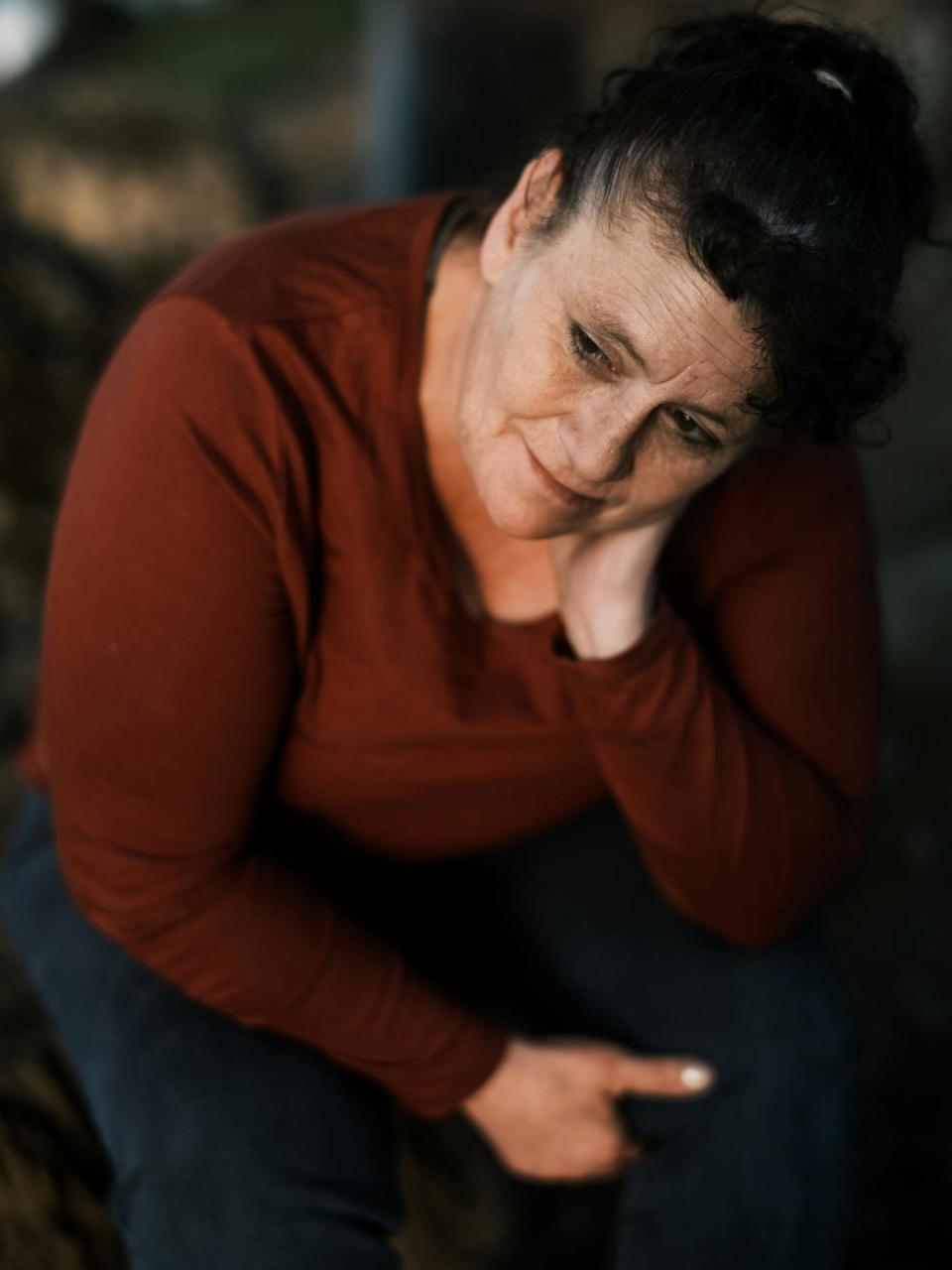
Cruz met Justin Wallace while both were living just out of town, on a hillside owned by the Bureau of Land Management known as Devil’s Slide. She couldn’t make rent, despite two cleaning jobs; he struggled to get back on his feet after a divorce and time in prison. The two moved to Morrison Park, walking distance to the low-income housing complex where Wallace’s sister lives.
In winter 2022, police offered Cruz and Wallace a spot at Foundry Village. To accept, the couple would have had to share a cell-size shed and give up one of their dogs—all for a temporary stop with no guarantees for the future. They refused. “As soon as we didn’t accept Foundry Village or get rid of the dog,” Cruz said, “all hell broke loose: ticket after ticket after ticket.” Police impounded her car and issued violations for things they’d ignored before. Sometimes, Wallace would collapse the tent around him and hide inside for the day, so he didn’t have to deal with the harassment.
On June 2, 2022, Cruz and Wallace were each cited for illegal camping and banished from Morrison Park. Two tickets in the same park in the same year qualify you for a park exclusion for 30 days. But the couple had appealed their first “scattering rubbish” tickets to the Oregon circuit court: They had kept their trash tied up neatly outside their tent. They thought they deserved their day in court to see if those tickets would stand; perhaps they wouldn’t qualify for the exclusions. So they appealed the orders, which the city handles directly. Cruz handwrote the appeals on ruled composition paper.
The City Council held two special meetings to adjudicate. The vaulted-ceiling council chambers served as a courtroom. The council members served as judges. The city attorney at the time, Augustus Ogu, represented the city and police. Officers Artoff and McGinnis stood as witnesses. “It’s a public meeting, we’re on television,” Mayor Bristol recalled. “It creates this kind of bizarre show.” I watched the recording on YouTube. Cruz’s pink bra straps were the only flash of color among the blues, grays, and beiges of the chambers and its inhabitants. Public defenders representing the couple brought up the ongoing appeals and asked for time to dispute individual tickets. The city refused.
“We continually hear that the city is under injunction,” Ogu said in his closing arguments. “That isn’t some sort of silver bullet.” The idea that “the city should be held to a standard, to a T,” but unhoused people wouldn’t, he said, was “fundamentally unfair.” Cruz and Wallace were still awaiting a date in circuit court, but the punishment arrived before the confirmation of a crime. The City Council voted unanimously to uphold the orders to banish the couple. Mayor Bristol signed them into effect.

